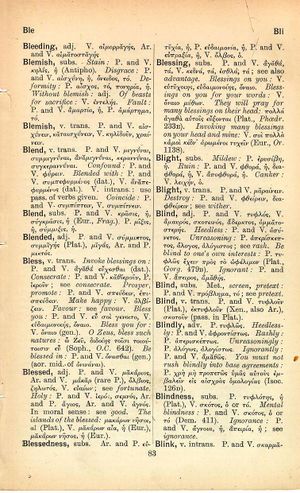blind: Difference between revisions
τούτων γάρ ὄνομα μόνον κοινόν, ὁ δέ κατά τοὔνομα λόγος τῆς οὐσίας ἕτερος → though they have a common name, the definition corresponding with the name differs for each (Aristotle, Categoriae 1a3-4)
(nlel) |
m (Woodhouse1 replacement) |
||
| Line 1: | Line 1: | ||
{{Woodhouse1 | {{Woodhouse1 | ||
|Text=[[File:woodhouse_83.jpg|thumb|link={{filepath:woodhouse_83.jpg}}]] | |Text=[[File:woodhouse_83.jpg|thumb|link={{filepath:woodhouse_83.jpg}}]] | ||
===adjective=== | |||
P. and V. [[τυφλός]], V. [[ἀμαυρός]], [[σκοτεινός]], [[ἄδερκτος]], [[ὀμματοστερής]]. | [[prose|P.]] and [[verse|V.]] [[τυφλός]], [[verse|V.]] [[ἀμαυρός]], [[σκοτεινός]], [[ἄδερκτος]], [[ὀμματοστερής]]. | ||
[[heedless]]: [[prose|P.]] and [[verse|V.]] [[ἀσύνετος]]. | |||
[[unreasoning]]: [[prose|P.]] [[ἀπερίσκεπτος]], [[ἄλογος]], [[ἀλόγιστος]]; see [[rash]]. | |||
[[be blind to one's own interests]]: [[prose|P.]] [[τυφλῶς ἔχειν πρὸς τὸ ὠφέλιμον]] ([[Plato]], ''[[Gorgias]]'' 479B). | |||
[[ignorant]]: [[prose|P.]] and [[verse|V.]] [[ἄπειρος]], [[ἀμαθής]]. | |||
===substantive=== | |||
Met., | Met., [[screen]], [[pretext]]: [[prose|P.]] and [[verse|V.]] [[πρόβλημα]], τό; see [[pretext]]. | ||
===verb transitive=== | |||
P. and V. τυφλοῦν ( | [[prose|P.]] and [[verse|V.]] [[τυφλοῦν]] ([[Plato]]), [[ἐκτυφλοῦν]] ([[Xenophon|Xen.]], also [[Aristophanes|Ar.]]), [[σκοτοῦν]] (pass. in [[Plato]]). | ||
}} | }} | ||
{{GermanLatin | {{GermanLatin | ||
Revision as of 08:51, 20 May 2020
English > Greek (Woodhouse)
adjective
P. and V. τυφλός, V. ἀμαυρός, σκοτεινός, ἄδερκτος, ὀμματοστερής.
unreasoning: P. ἀπερίσκεπτος, ἄλογος, ἀλόγιστος; see rash.
be blind to one's own interests: P. τυφλῶς ἔχειν πρὸς τὸ ὠφέλιμον (Plato, Gorgias 479B).
ignorant: P. and V. ἄπειρος, ἀμαθής.
substantive
Met., screen, pretext: P. and V. πρόβλημα, τό; see pretext.
verb transitive
P. and V. τυφλοῦν (Plato), ἐκτυφλοῦν (Xen., also Ar.), σκοτοῦν (pass. in Plato).
German > Latin
blind, I) eig.: caecus (im allg.). – oculis oder luminibus captus (an der Sehkraft gehindert, geschwächt). – luminibus orbatus (der Sehkraft beraubt; beide durch Krankheit od. einen Unglücksfall). – auf einem Auge b., altero oculo captus (vgl. »einäugig«): b. u. taub, oculis et auribus captus: b. werden, auf einem Auge b. werden. s. erblinden: b. sein, caecum esse b. machen, s. blenden no. I: o daß ich doch b. wäre! vellem oculos non habere! – bei den Verbrechen jmds. sich b. stellen, in sceleribus alcis conivere. – Sprichw., bei hellem Tage, mit offenen od. sehenden Augen b. sein, caligare in sole (Quint. 1, 2, 19); quod ante pedes est, non videre (Cic. Tusc. 5, 114): das leuchtet auch einem Blinden ein, das sieht ein Blinder ein, apparet id etiam caeco (Liv. 32, 34, 3); caecis hoc, ut aiunt, satis clarum est (Quint. 12, 7, 9). – II) übtr.: 1) der Augen des Verstandes beraubt: a) von Pers.: caecus. occaecatus. – temerarius (der blindlings u. aufs Geratewohl urteilt u. handelt). – hebes (geistig abgestumpft). – b. für etwas, caecus, hebes ad alqd. – die Menschen b. machen, homines caecos reddere od. efficere (v. Glück, v. Habsucht etc.): b. darauf loshauen, temere pugnare. – b) v. Lebl.: caecus. – stultus (töricht). – b. Zufall, s. Zufall: b. Leidenschaft, b. Wut, furor: inh. Wut, caecus amentiā: b. Gehorsam gegen jmd. zeigen, totum se fingere et accommodare ad alcis arbitrium et nutum; totum se ad alcis nutum et voluntatem convertere. – 2) versteckt, verborgen: caecus (Ggstz. patens, z. B. fossa). – einen b. Graben machen, fossam occaecare; fossam cratibus integere et aggere explere. – 3) nicht durchsichtig: caecus (z. B. gemma). – hebes. hebetatus (matt von Glanz, z. B. carbunculus). – b. werden, hebetari. – 4) scheinbar, erdichtet: caecus. – fictus. simulatus (erdichtet, zum Schein gemacht). – falsus. vanus (falsch, grundlos, z. B. falsa opinio [[[Vorurteil]]]: vana superstitio, vanus tumultus). – ein b. Fenster, imago fenestrae: ein b. Angriff, s. Scheinangriff.

